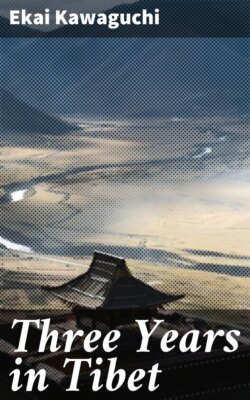Читать книгу Three Years in Tibet - Ekai Kawaguchi - Страница 28
На сайте Литреса книга снята с продажи.
CHAPTER XXIV.
‘Bon’ and ‘Kyang.’
ОглавлениеTable of Contents
I walked about five miles over the sand and then reached a piece of grass-land. Beyond this I came to a plain of stones of curious shapes, in the centre of which a solitary mountain rose to a considerable height. I subsequently learned that the mountain was the sacred abode of the deities of the Bon religion. Bonism is an ancient religion of Tibet, which commanded considerable influence before the introduction of Buḍḍhism into that country. It has still some adherents, but it continues to exist only for its name’s sake. Originally Bonism very much resembled Hinḍuism; but now, in theory, it is almost Buḍḍhism. This similarity is explained in this way. When it was superseded by Buḍḍhism, a certain Bon priest recast his religion after the pattern of Buḍḍhism, and called the revised product the New Bonism. Without attempting to give any special particulars of its doctrines, I may say that the New Bonism, when shorn of its sacrifices, its toleration of marriage and of the use of intoxicants, is only Buḍḍhism under another name. The Bon deities have no shrines or temples dedicated to them, and are believed to inhabit some particular mountain, or snowy peak, or pond, or lake. And it was upon one of these divine abodes that I had chanced, but lacking at the time all knowledge of Bonism, my attention was soon diverted by coming in sight of a couple of kyangs.
A LUDICROUS RACE.
As I have already said, kyang is the name given by the Tibetans to the wild horse of their northern steppes. More accurately it is a species of ass, quite as large in size as a large Japanese horse. In color it is reddish brown, with black hair on the ridge of the back and black mane and with the belly white. To all appearance it is an ordinary horse, except for its tufted tail. It is a powerful animal, and is extraordinarily fleet. It is never seen singly, but always in twos or threes, if not in a herd of sixty or seventy. Its scientific name is Equus hemionis, but it is for the most part called by its Tibetan name, which is usually spelt kyang in English. It has a curious habit of turning round and round, when it comes within seeing distance of a man. Even a mile and a quarter away, it will commence this turning round at every short stage of its approach, and after each turn it will stop for a while, to look at the man over its own back, like a fox. Ultimately it comes up quite close. When quite near it will look scared, and at the slightest thing will wheel round and dash away, but only to stop and look back. When one thinks that it has run far away, it will be found that it has circled back quite near, to take, as it were, a silent survey of the stranger from behind. Altogether it is an animal of very queer habits.
But to come back to my story: my two sheep, apparently frightened by the approach of the rotating horses, made a dash for freedom with such suddenness and simultaneity that I lost my hold of the two ropes; I then proceeded to run a race with them, in a frantic effort to recapture them. And a ludicrous race it was, in which I finally fell panting and giddy. While it lasted the horses seemed thoroughly to enjoy it, and getting into the spirit of the thing they galloped with me, but only to chase my sheep further away from me. When I lay prostrate, the sheep stopped running and began quietly to graze. The horses also stopped, and appeared quite astonished at the whole performance. I then perceived my blunder. On rising, I quietly walked up to my sheep, and without a movement they allowed me to regain their ropes.
All is well that ends well. But on that occasion one thing was not quite satisfactory, for I soon discovered that one of my sheep had lost a part of my luggage from its back, no doubt during that memorable race. I then set out to hunt after the lost bundle; but it was all useless, for we had not run the race over any regular course, and it was impossible to follow our footsteps. One may as well look for a parcel lost in the sea, as try to hunt up a small bundle, lying hidden under grass and leaves, somewhere in an immense plain. Besides, I argued with myself thus: the missing bundle contained some fifty rupees in cash, my watch and compass, and an assortment of western trinkets; it would have been better not to lose the money, certainly, but it was, after all, a small portion of what I had with me, and I could do well without it. It was hard to part with the watch and the compass, and the trinkets would have been of service in making friends with the simple natives; but, looked at from another point of view, the possession of these things might arouse the suspicion of the more intelligent Tibetans, and it was most likely that the Lord Buḍḍha, in His wisdom and mercy, had caused me to be rid of them. Arriving at this conclusion, I gave up my search in a spirit of meek resignation.
